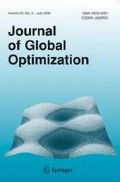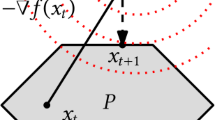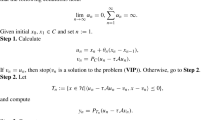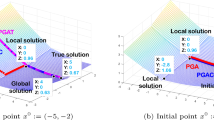Abstract
The Douglas–Peaceman–Rachford–Varga operator splitting methods (DPRV methods) are attractive methods for monotone variational inequalities. He et al. [Numer. Math. 94, 715–737 (2003)] proposed an inexact self-adaptive operator splitting method based on DPRV. This paper relaxes the inexactness restriction further. And numerical experiments indicate the improvement of this relaxation.
Similar content being viewed by others
References
Bertsekas D.P. and Tsitsiklis J.N. (1989). Parallel and Distributed Computation: Numerical Methods. Prentice-Hall, Englewood Cliffs
Douglas J. and Rachford H.H. (1956). On the numerical solution of heat conduction problems in two and three space variables. Trans. Amer. Math. Soc. 82: 421–439
Eckstein J. and Bertsekas D.P. (1992). On the Douglas-Rachford splitting method and the proximal point algorithm for maximal monotone operators. Math. Program. 55: 293–318
Ferris M.C. and Pang J.S. (1997). Engineering and economic applications of complementarity problems. SIAM Rev. 39: 669–713
Fischer A. (1997). Solution of monotone complementarity problems with locally Lipschitzian functions. Math. Program. 76: 513–532
Fukushima M. (1996). The primal Douglas-Rachford splitting algorithm for a class of monotone mappings with application to the traffic equilibrium problem. Math. Program. 72: 1–15
Harker P.T. and Pang J.S. (1990). A damped–Newton method for the linear complementarity problem. Lectures in Appl. Math. 26: 265–284
He B.S. (1999). Inexact implicit methods for monotone general variational inequalities. Math. Program. 86: 199–217
He B.S., Liao L.-Z. and Wang S.L. (2003). Self-adaptive operator splitting methods for monotone variational inequalities. Numer. Math. 94: 715–737
Lions P.L. and Mercier B. (1979). Splitting algorithms for the sum of two nonlinear operators. SIAM J. Numer. Anal. 16: 964–979
Marcotte P. and Dussault J.P. (1987). A note on a globally convergent Newton method for solving variational inequalities. Oper. Res. Lett. 6: 35–42
Peaceman D.W. and Rachford H.H. (1955). The numerical solution of parabolic and elliptic differential equations. J. Soc. Indust. Appl. Math. 3: 28–41
Taji K., Fukushima M. and Ibaraki T. (1993). A globally convergent Newton method for solving strongly monotone variational inequalities. Math. Program. 58: 369–383
Varga R.S. (1962). Matrix Iterative Analysis. Prentice-Hall, Englewood Cliffs, New Jersey
Zhu T. and Yu Z.G. (2004). A simple proof for some important properties of the projection mapping. Math. Inequal. Appl. 7: 453–456
Author information
Authors and Affiliations
Corresponding author
Rights and permissions
About this article
Cite this article
Li, M., Bnouhachem, A. A modified inexact operator splitting method for monotone variational inequalities. J Glob Optim 41, 417–426 (2008). https://doi.org/10.1007/s10898-007-9229-y
Received:
Accepted:
Published:
Issue Date:
DOI: https://doi.org/10.1007/s10898-007-9229-y




